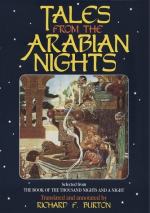[FN#49] Lane translates this, “May Allah and the Rijal retaliate upon thy temple!”
[FN#50] Arab. “Ya aba ’l-lithamayn,” addressed to his member. Lathm the root means kissing or breaking; so he would say, “O thou who canst take her maidenhead whilst my tongue does away with the virginity of her mouth.” “He breached the citadel” (which is usually square) “in its four corners” signifying that he utterly broke it down.
[FN#51] A mystery to the Author of Proverbs (xxx. 18-19),
There be three things which are too wondrous for me,
The way of an eagle in the air;
The way of a snake upon a rock;
And the way of a man with a maid.
[FN#52] Several women have described the pain to me as much resembling the drawing of a tooth.
[FN#53] As we should say, “play fast and loose.”
[FN#54] Arab. “Nahi-ka” lit.=thy prohibition but idiomatically used=let it suffice thee!
[FN#55] A character-sketch like that of Princess Dunya makes ample amends for a book full of abuse of women. And yet the superficial say that none of the characters have much personal individuality.
[FN#56] This is indeed one of the touches of nature which makes all the world kin.
[FN#57] As we are in Tartary “Arabs” here means plundering nomades, like the Persian “Iliyat” and other shepherd races.
[FN#58] The very cruelty of love which hates nothing so much as a rejected lover. The Princess, be it noted, is not supposed to be merely romancing, but speaking with the second sight, the clairvoyance, of perfect affection. Men seem to know very little upon this subject, though every one has at times been more or less startled by the abnormal introvision and divination of things hidden which are the property and prerogative of perfect love.
[FN#59] The name of the Princess meaning “The World,” not unusual amongst Moslem women.
[FN#60] Another pun upon his name, “Ma’aruf.”
[FN#61] Arab. “Naka,” the mound of pure sand which delights the eye of the Badawi leaving a town. See vol. i. 217, for the lines and explanation in Night cmlxiv. vol. ix. p. 250.
[FN#62] Euphemistic: “I will soon fetch thee food.” To say this bluntly might have brought misfortune.
[FN#63] Arab. “Kafr"=a village in Egypt and Syria e.g. Capernaum (Kafr Nahum).
[FN#64] He has all the bonhomie of the Cairene and will do a kindness whenever he can.
[FN#65] i.e. the Father of Prosperities: pron. Aboosa’adat; as in the Tale of Hasan of Bassorah.
[FN#66] Koran lxxxix. “The Daybreak” which also mentions Thamud and Pharaoh.
[FN#67] In Egypt the cheapest and poorest of food, never seen at a hotel table d’hote.
[FN#68] The beautiful girls who guard ensorcelled hoards: See vol. vi. 109.
[FN#69] Arab. “Asakir,” the ornaments of litters, which are either plain balls of metal or tapering cones based on crescents or on balls and crescents. See in Lane (M. E. chapt. xxiv.) the sketch of the Mahmal.




